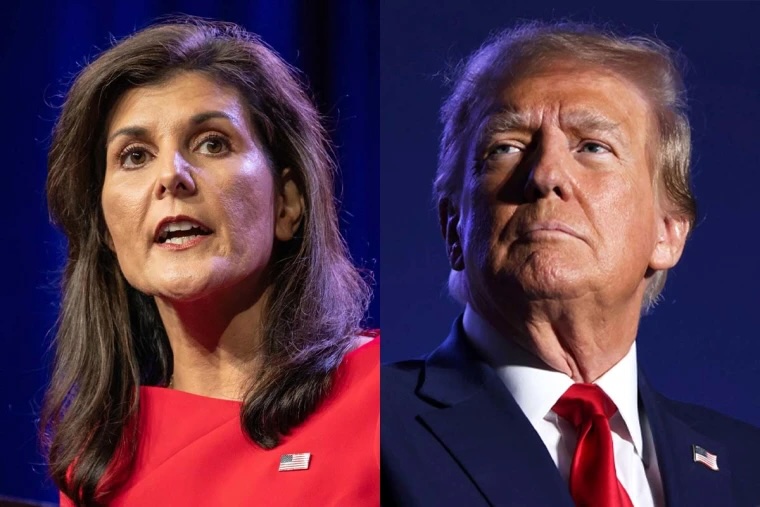Nikki Haley, the first woman of color to be a considerable Republican candidate for president, faced continuous obstacles throughout her campaign — notably how to associate with her identity while appealing to white, conservative audiences. After winning only Vermont during Super Tuesday, Haley dropped out of the presidential election.
Haley’s parents, Ajit Singh Randhawa and Raj Kaur Randhawa, emigrated to South Carolina from India in 1964, where Haley was later born in 1972. While her birth name was Nimarata Nikki Randhawa, Haley has been going by “Nikki,” meaning “little one” in Punjabi, since childhood. She also adopted her husband’s surname “Haley” following their marriage in 1996.
Haley graduated from Clemson University in 1994 with a Bachelor of Science in Accounting and Finance, and she was later elected into the House of Representatives for South Carolina in 2004. She was re-elected in 2008, and then served as South Carolina governor from 2011 to 2017. Following both terms, Haley served as a representative for the United Nations under the Donald Trump administration in 2017.
Haley shares many of the same right-wing political beliefs as other Republican politicians. In the January 10 presidential primary debate, Haley shared that she is “unapologetically pro-life,” pro “reimplementing a ‘Remain in Mexico’ policy, and deporting illegal immigrants” and is “opposed to transgender healthcare for those under 18.”
Throughout her candidacy, Haley has long acknowledged her identity as a Republican and as a woman of color. In a video on Haley’s campaign website, she shares, “I was the proud daughter of Indian immigrants. Not black, not white, I was different. But my mom would always say your job is not to focus on the differences, but the similarities. And my parents reminded me and my siblings every day how blessed we were to live in America.”
Despite this recognition of her identity, in recent months, Republican presidential candidate, Donald J. Trump has publicly mocked Haley’s birth name, referring to her as “Nimbra” and “Nikki ‘Nimrada’ Haley” on social media. Trump has used these remarks to appeal to his own audience, while tearing Haley and her campaign down. In referencing Haley’s birth name, Trump attracts the attention of right-leaning conservatives by questioning the legitimacy of Haley’s campaign — insinuating that because Haley does not have a Eurocentric name, she is not a valid United States citizen, and therefore is not eligible to be president of the United States.
These “false birther” claims may ring a bell, as this is not the first time that Trump has questioned a presidential candidate’s birth certificate. Starting in 2011, Trump has continuously made accusations about former president Barack Obama’s country of birth.
“Why doesn’t he show his birth certificate? There’s something on that birth certificate that he doesn’t like,” said Trump on American talk show, The View. Trump later made a comment acknowledging that Obama was born in the U.S., however, he continued to make statements surrounding Obama’s citizenship in the following years. Similarly, during the current presidential election, Trump has made comments including the phrase “wherever she may come from” with regard to Nikki Haley.
Despite these comments, Haley stands by the claim that “America isn’t a racist country,” attributing Trump’s comments to the feeling that his campaign is being jeopardized. Haley told CNN, “That’s what he does when he feels threatened. That’s what he does when he feels insecure.” However, when considering Trump’s racist comments, many onlookers of Haley’s campaign have been quick to question this notion. Conversely, Haley’s statement seems to have worked in her favor — providing her space to address her identity and appeal to her audience through shared beliefs.
But Haley and Trump both appeal to vastly differing groups within the Republican Party. According to Politico, “Trump wins huge margins with very conservative voters, evangelicals and those without a 4-year college degree. Haley does best among the college-educated, with non-evangelicals and moderates.” In addition, as stated by the Washington Post, “His [Trump’s] voters are also much more conservative. Fifty-two percent of them identified as “very conservative,” a jump of more than 20 points since 2016. But Republican women have stayed with Trump. They made up 46% of his base in the first three primary states, a slight increase over 2016.”
These demographics bring into question Trump and Haley’s identity and how they influence their voter pools. Trump’s female voter population suggests that gender is not a prime cause when it comes to voter identity and whether or not that aligns with the candidate.
So the question becomes, what is it about Trump and Haley that causes such a stark divide in their voter pools?
There could be any number of reasons — down to the specific initiatives that they endorse, differing allocation of funds or even how they present themselves in the media. However, it is also possible that voters are being swayed by their own identity (race, gender, sexual orientation, religion, socio-economic status) and how they relate to that of the candidate — a topic commonly referred to as “identity politics.”
Published in July of 2023 by Pew Research Center, “more than eight-in-ten Republican voters in 2022 (85%) were white while roughly 36% of Democrat voters were non-white.” This information is generally consistent with other data from as early as 2016.
The statistical difference in party makeup may suggest that Haley is in many ways running to represent voters who, historically, demonstrate a bias towards candidates that share their background — with regard to both race and gender.
Despite Haley’s best attempt to both appeal to her audience and accept her identity, Trump led the primaries with 1,031 delegates, including from South Carolina — Haley’s home state — as Haley trailed behind with 89 delegate nominations.
This begs the question — are voters making decisions based on the identity of the candidate or the morals they represent?







